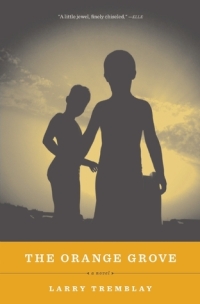Reviewed by Rachael Daum
The Orange Grove
Larry Tremblay
Translated by Sheila Fischman
Milkweed Editions
There’s a lot in this book to give away. Instead of trying to sum up the plot or the characters, perhaps more helpful is a simple outline of some characteristics of the book because the language and the characters are themselves, delightfully, as much a giveaway here as the plot:
The family in this book is unlucky. They are a father, a mother, two twin boys, and two murdered grandparents. The twin boys are called Amed and Aziz. Amed is healthy, but Aziz is sick, and has been to the big city. The boys flew a kite, and the string broke. Their father has an orange grove. The boys know another boy who blew himself up. The twins are told that they have been chosen by God.
This book is a fairy tale. The title is a fairy tale; the characters are fairy tales; the language is a fairy tale. Indeed, the meandering voice, perhaps itself the main character of the novel, bleeds into the voices of the characters themselves. See the narrative of the twin boys’ father, Zahed:
Observe, my sons, the purity of the light. Lift your heads. Look, a single cloud is drifting in the sky. It’s very high and is slowly thinning out. In a few moments, it will be a mere thread dissolved in the blue. Look. You see, it no longer exists. All is blue. It’s strange. There’s no breeze today. The far-off mountain seems to be dreaming. Even the flies have stopped buzzing. All about us the orange trees are breathing in and out in silence. Why such calm, why such beauty?
This is a book of constant forking in the road, two choices before not just the characters but the readers: which son to sacrifice? Which brother to be? Which history to believe? To comfort or to keep on? Can we as readers even tell the difference between these choices, as it is so difficult to even tell the brothers themselves apart? The fault of this book is the same as the fault of people who suffer, which is no fault at all: the wrong paths get chosen, or we get pushed down them.
Overall, this book is truly a gem. It is only 150 pages long, and reads smoothly and quickly—thanks, of course, to the work of the translator from the French, Sheila Fischman (can we put a petition together to get her name on the cover, please, Milkweed? For shame!). The language is flowing, and tinged with a little something—though it’s hard to pin down what exactly. Sadness, certainly, guilt, and perhaps joy in the writing. The language is ornate, such that it seems, from my experience at least, more as though it has been translated from Arabic or Persian than from French—in this way, it is masterful in its decoration.
The only complaint I voice with the book is the rather out-of-place seeming ending, which literally displays the theatricality of war. Who is allowed to make art out of war? Those who watch it? Those who survive? Should it be the springboard for art in the first place? These are, frankly, worn questions, and it almost seems to cheapen the ending of the narrative to suddenly withdraw and beg an audience’s stance; the reader has, after all, long been conscious of her part as audience member. This is of course done with great deliberation—the author, after all, is a Quebecois writer, forcibly apart from the war at hand in the book—but the placement of it is, for this reader at least, less than effective.
Despite this, the book’s narrative is rich, particularly in its doubling and its questioning of voice. For example, the monster Amed repeatedly draws called Dôdi has “two mouths, one very little and one very big. Dôdi used his little mouth to communicate with insects and microbes. He used his big mouth to strike fear into the monsters he battled. But Dôdi sometimes spoke with his two mouths at the same time. Then the words he pronounced were comically deformed, creating new words and jumbled sentences that made [the brothers] laugh.” Here, simultaneity begets hilarity at best, and misunderstanding—and the harm that follows—at worst. Throughout the book, there is a seeming kaleidoscopic movement of two circles, overlapping, moving away from each other, and coming back together. It is only in shattering the kaleidoscope that the madness and confusion of these cases of doubling, speech, and separation are scattered—but this, too, is madness.
Rachael Daum is the Publicity Manager for ALTA. She earned her Bachelor’s in English: Creative Writing at the University of Rochester, and has an MA in Russian language and literature in Russian language and literature from Indiana University. Her hope is to continue work in translating literature from Russian, German, and Serbian/Bosnian/Croatian. She lives in New York City. You can find her @Oopsadaisical.
for ALTA. She earned her Bachelor’s in English: Creative Writing at the University of Rochester, and has an MA in Russian language and literature in Russian language and literature from Indiana University. Her hope is to continue work in translating literature from Russian, German, and Serbian/Bosnian/Croatian. She lives in New York City. You can find her @Oopsadaisical.
